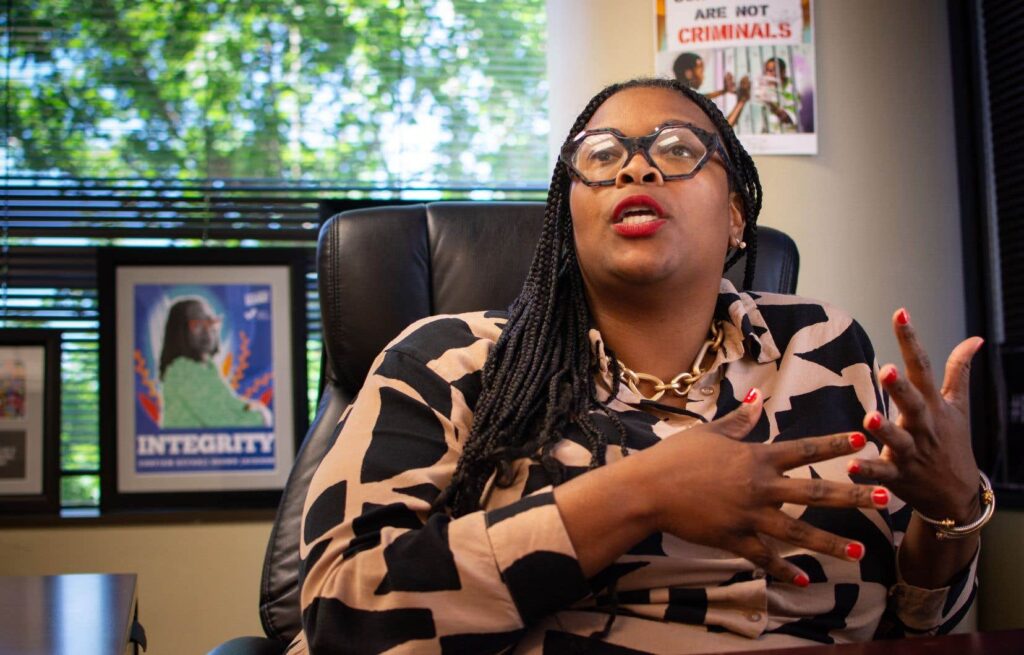In the summer of 1964, a popular uprising took over Mississippi, a segregated state in the southern United States, to demand that African-Americans be able to exercise their right to vote. Sixty years later, on the eve of the American presidential election, this cry from the heart still resonates. So much so that dozens of organizations hope to revive the struggles of this “freedom summer” to overcome the electoral obstacles that still affect black people.
“The civil rights struggle is far from over,” says Waikinya Clanton, who spent a decade working in federal politics in Washington. Three years ago, the Mississippi native returned to Jackson, the state capital, to run the regional office of the Southern Poverty Law Center, a nonprofit that advocates for racial justice, among other things.
“My heart has always been in Mississippi. No matter what I did, I was rooted in the need to do it here at home,” she said.
The “Magnolia State,” as it is nicknamed because of the flowering tree that grows in the region, has a population of nearly 40 percent African-Americans. In Jackson, that rate is more than 80 percent, according to the most recent census.
“You can’t be Black in Mississippi and not be connected to the legacy of the civil rights struggle,” Clanton said. “For decades, people here have understood the importance of being able to voice their needs and concerns. They also know what it’s like to not have the ability to do that,” she added.
Although black people won the right to vote in the United States in 1870, for nearly a century only a tiny minority were able to exercise it in the segregated South. It wasn’t until the civil rights movement of the 1960s—which called for the abolition of all forms of racial discrimination, including restrictions on voting—that things changed.
In 1964, fewer than 7 percent of black Mississippians were registered to vote. And for good reason: they faced intimidation at the polls, had to take unusually stringent literacy tests, and feared violent retaliation.
During the summer that became known as Freedom Summer, civil rights organizations orchestrated a massive drive to register black voters despite the risks to their safety. Nearly 1,000 students from across the United States—most of them white—came to Mississippi at the invitation of the organizations to lend a hand to the movement. The movement gained national attention when three young volunteers, two white and one black, were murdered by white supremacists from the Ku Klux Klan, who were covered up by local police.
A year later, in August 1965, President Lyndon B. Johnson signed the Voting Rights Act, which formally banned discriminatory voting practices in the United States.
Barriers that remain
But the racism and structural discrimination faced by black voters in Mississippi are far from gone, Clanton said. “What we’re seeing in this country right now is a reversal of effort. There are people who are trying to find ways to take away our ability to elect our leaders.”
In addition to the partisan redistricting of electoral districts (the gerrymandering), which neutralizes the weight of their vote, black citizens are particularly affected by the lack of early voting and by the disqualification of citizens who have committed certain crimes, a “relic” of the 1890 Constitution, argues the Southern Poverty Law Center.
But having a voice is crucial to reducing persistent discrimination, says Waikinya Clanton. “Inequality here looks like a lack of investment in infrastructure. It looks like a city struggling to survive because it doesn’t have clean water, an education system that’s constantly draining money from public schools and giving it to private schools, people working in the fields who are struggling to feed themselves…”
Tariq Abdul-Tawwab, a community organizer with the People’s Advocacy Institute, agrees. The social justice organization, along with dozens of other groups, has joined the Southern Poverty Law Center’s campaign to try to register 60,000 new voters statewide this election year.
On a hot Saturday in June, Tariq and his young team of interns prepare informational leaflets on voter registrations to be distributed door to door. He is trying to train the next generation, deploring a form of political disengagement in his community, which struggles to find its way in the Republican politics of this deep red state.
“People don’t see change even if they vote,” he notes. “And voting can affect the jobs that black people get, the schools they can send their kids to, the violence they face in their communities.”
Keeping black voters engaged is crucial in Mississippi, he said, where not voting can lead to being removed from the voter rolls in purges.
“Some people don’t even know they’ve been removed from the rolls and sometimes don’t realize it until election day,” he said. To prevent that, he and his team are scanning the rolls and canvassing Jackson neighborhoods to notify those affected.
“Freedom Summer reminds us of our duty not only to continue voting, but also to ensure that our young people understand what we risked to gain that right,” concludes Tariq Abdul-Tawwab.
This report from the American Election Mail was funded with support from the Transat International Journalism Fund.The duty.

